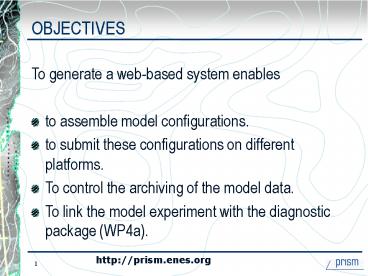An Introduction to PRISM and the PRISM Coupler PowerPoint PPT Presentation
1 / 11
Title: An Introduction to PRISM and the PRISM Coupler
1
OBJECTIVES
- To generate a web-based system enables
- to assemble model configurations.
- to submit these configurations on different
platforms. - To control the archiving of the model data.
- To link the model experiment with the diagnostic
package (WP4a).
2
Web Services Architecture
- Delivering remote capabilities to the users
Local PRISM site Supercomputer Run
infracstructure
HIGH SPEED DISK
Experiment configurations
Batch Job
Local PRISM site Supercomputer Run
infracstructure
Batch Job
Central PRISM site web infracstructure
Batch Job
Local PRISM site Supercomputer Run
infracstructure
3
Web Software Components
Web Server
Super- computer
Domain Server
Application Server
Domain Server
Super- computer
Apache
Netscape
Climate model
Java server
Tomcat
Climate model
Java server
4
Applications
- PRISM software components supporting the running
of climate models - PrepIFS GUI model configuration tool
- SMS/Xcdp Job scheduler and monitoring GUI
- CVS Code versioning
- Diagnostics PRISM visualisation package
- Web GUI Database and diagnostics web interface
5
System Information Flow
Configuration With PrepIFS
Monitoring with Xcdp
Job contol commands
HIGH SPEED DISK
Save to disk
Supervisor Monitor Scheduler (SMS)
Submission of job control structure and job
definition
Configuration
Specific Model Run Job definition
Parametrisation process
Model code Job definition templates Run scripts
Submit complete job for local or remote execution
Execution host Queuing system
Extraction
CVS repository
Job Running
6
PREPIFS
- To select individual model components to couple.
- To configure the Specific Model Input and Output
Configuration (SMIOC). - To compose the Specific coupling configuration
(SCC). - To select pre-/post processing options.
- To select the site and computing resources.
7
SMS/XCDP
SMS enables user to run a large number of
programs with
- Dependencies on one another.
- Dependencies in time.
- A good tolerance of hardware and software
failures. - Good restart capabilities
8
Basic Phases
- DEFINITION of an experiment by the Model
Administrator (with PREPIFS) - - Model interfaces, metadata - PMIOD,
diagnostic options, I/O options... Etc - COMPOSITION by the user of a specific coupled
experiment (with PREPIFS). - - Selection and modification of the defaults
options - - Automatic consistency checking
- DEPLOYMENT of a compact description of this
specific experiment understood by the computer
operating system (with or without SMS)
9
DEFINITION phase
The model administrator will provide the
description of resources that the coupled
experiment needs. This list will be ultimately in
a XML format.
- Model interface
- I/O options
- Post-processing options
- Etc...
10
COMPOSITION phase
Prepifs will read the xml format file and
displays the default options specified by the
model administrator. Then the user can select
and modify the experiment setup.
- Compiling options
- Build options
- Running parameters
- Site specific
- Etc ...
11
DEPLOYMENT phase
When the specific experiment is submitted by the
user through the interface, several files are
generated and contain a compact description of
this experiment. These files can be then included
in any script.
- Information to run the experiment
- Information on the coupling communication between
models but also internally between elements of a
model - Etc..

